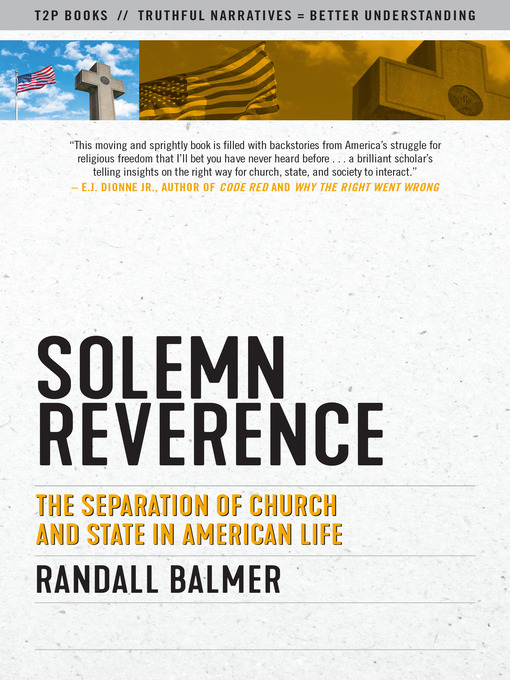- Popular Magazines
- Just Added
- Cooking & Food
- Fashion
- Health & Fitness
- Home & Garden
- News & Politics
- See all magazines collections
The First Amendment to the US Constitution codified the principle that the government should play no role in favoring or supporting any religion, while allowing free exercise of all religions (including unbelief). More than two centuries later, the results from this experiment are overwhelming: The separation of church and state has shielded the government from religious factionalism, and the United States boasts a diverse religious culture unmatched anywhere in the world. In Solemn Reverence, Randall Balmer, one of the premier historians of religion in America, reviews both the history of the separation of church and state as well as the various attempts to undermine that wall of separation. Despite the fact that the First Amendment and the separation of church and state has served the nation remarkably well, he argues, its future is by no means assured.
-
Creators
-
Series
-
Publisher
-
Release date
February 2, 2021 -
Formats
-
Kindle Book
-
OverDrive Read
- ISBN: 9781586422721
-
EPUB ebook
- ISBN: 9781586422721
- File size: 2364 KB
-
-
Languages
- English
-
Reviews
-
Kirkus
November 15, 2020
A slender but thoroughly argued case for reinforcing the wall between church and state. Balmer, a historian of evangelicalism in America and professor of religion at Dartmouth, is firmly on the side of a truly secular public sphere, trusting in the wisdom and logic of the "establishment clause," the portion of the First Amendment that prohibits the establishment of an official or officially endorsed religion. There are good reasons for that clause, including the fact that the Puritanism and Quakerism of the Northern states were much different from the Anglicanism and breakaway Protestantism of the Southern ones. Rather than allow the state to impose a religious preference on its population, writes the author, the models to follow are those of Roger Williams, William Penn, and Thomas Jefferson, the last of whom protested that to tax a citizen in order to support an established church "is sinful and tyrannical." Fast-forward to the rise of the religious right, which "mobilized not, as commonly supposed, to battle abortion, but rather to defend racial segregation in evangelical institutions such as Bob Jones University." As an instrument of emergent White nationalism, the religious right has been well served by the current administration and Supreme Court, which, in a 2020 decision, allowed people like the current secretary of education to feast on funds diverted from public coffers and given to private religious schools. The "religious liberty" that the religious right seeks is less about the diversion of funds and more about the imposition of discriminatory measures against putative enemies and the suppression of the rights of minorities. The irony in all of this, notes the author, is that evangelical churches in particular have flourished in this country precisely because not oppressed by an official religion: "This has lent an energy and dynamism to religious life in America, a vitality unmatched anywhere in the world." A stern warning that those who push for the intrusion of religion into public life do so at the peril of both.COPYRIGHT(2020) Kirkus Reviews, ALL RIGHTS RESERVED.
-
Formats
- Kindle Book
- OverDrive Read
- EPUB ebook
subjects
Languages
- English
Loading
Why is availability limited?
×Availability can change throughout the month based on the library's budget. You can still place a hold on the title, and your hold will be automatically filled as soon as the title is available again.
The Kindle Book format for this title is not supported on:
×Read-along ebook
×The OverDrive Read format of this ebook has professional narration that plays while you read in your browser. Learn more here.

